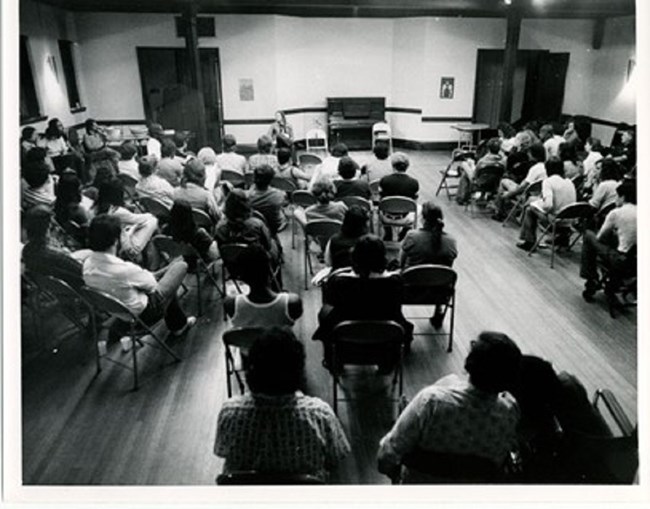Last updated: February 14, 2025
Article
Mattachine Society

Manuscripts and Archives Division, The New York Public Library. "Homosexuals are different" The New York Public Library Digital Collections. 1960. https://digitalcollections.nypl.org/items/671159d8-0455-a33c-e040-e00a180655cb

The Madeline Davis GLBT Archives of Western New York
A secret Los Angeles organization was founded by a force of like-minded men in 1950. This organization, formally known as the Mattachine Society, was one of several prominent organizing groups during the period of early LGB activism. It served as a social group where members could air their grievances about the discriminatory policies that plagued their community at the time. The collective actions of early LGB groups, notably the Mattachine Society, the Janus Society, and the Daughters of Bilitis, set the stage for the gay rights movement, thus, changing the trajectory of the movement and contributing for the large-scale liberation movement to follow.
The term “mattachine” comes from the French society of masked dancers and players referred to as the Societé Mattachine[1]. This playgroup was known for its satirization of social conventions and constructions. Inspired by the French group, the Mattachine Society focused its initiatives on the idea that government, religion, and psychiatry are agents of oppression. Members of Mattachine worked tirelessly to stop police entrapment of gay men and to provide legal advice to those who were arrested[2]. The Society also addressed the stigmatization around the term ‘homosexuality’ and outwardly protested the prohibition of LGB groups from meeting in bars, notably through Sip Ins.
Dick Leitsch served as the President of the New York City Chapter of the Mattachine Society from 1964 to 1972. Leitsch, alongside fellow Mattachine members John Timmins, Craig Rodwell, and Randy Wicker, famously challenged the regulation that prohibited bartenders from serving gay clients during a “Sip In” at Julius’ Bar in 1966. The concept of “Sit-Ins” during the Civil Rights Movement inspired the small-scale protest at Julius’, which later launched a court case addressing the status of service to gay patrons[3].
Upon the escalation of events at Stonewall on the evening of June 28, 1969, the Mattachine Society formed emergency relationships with the New York City’s Mayor’s Office and the Police Department. Members met with these city officials to urge the discouragement of further protests the following day. On the window of the Stonewall Inn, in brightly capitalized painted letters, read: “WE HOMOSEXUALS PLEAD WITH OUR PEOPLE TO PLEASE HELP MAINTAIN PEACEFUL AND QUIET CONDUCT ON THE STREETS OF THE VILLAGE -MATTACHINE.”
The Mattachine Society historically preferred to press for change through legal and political channels[4]. They closely followed the law and respected it greatly. However, Mattachine saw the Stonewall Uprising as a means of taking away from their gains and the progress they have collectively made for the movement. They acted unprecedentedly by writing the message on the window of the Inn. Michael Bronski, a Harvard professor of the practice in media and activism in Studies of Women, Gender, and Sexuality, commented on the phrase saying, “So literally overnight, Mattachine is forced into making a public announcement with essentially graffiti.”
In early July of 1969, members of the newly-founded Mattachine Action Committee (MAC) announced a public forum on the topic of Gay Power. Nearly 100 participants attended the forum and enthusiastically voted to stage a protest against police harassment. An argument broke out on July 16th, 1969, during a forum held at Saint John’s Episcopal Church. One half of the Society wanted to retain the favor of the Establishment and the other half wanted to overthrow it. This schism within Mattachine prompted the creation of the Gay Liberation Front. The GLF established itself as a new and more radical LGB organization that was unafraid to use confrontation to push reform.
The argument between the Mattachine Society and what became the Gay Liberation Front represented the tensions at the heart of the post-Stonewall LGB movements. If it weren’t for the mobilization efforts of the Mattachine Society, Pride would simply not exist the way it does today.
[1] https://www.villagepreservation.org/2021/07/16/the-mattachine-society-and-the-post-stonewall-shift/
[2] https://archives.nypl.org/mss/1911
[3] https://www.villagepreservation.org/2022/04/21/the-documents-of-history-mattachine-society-of-new-yorks-archival-papers-of-1951-1976-at-the-new-york-public-library/
[4] https://news.harvard.edu/gazette/story/2019/06/harvard-scholars-reflect-on-the-history-and-legacy-of-the-stonewall-riots/


Left image
Card outlining steps to take if stopped by police
Credit: Manuscripts and Archives Division, The New York Public Library. "Card outlining steps to take if stopped by police" The New York Public Library Digital Collections. 1960 - 1969. https://digitalcollections.nypl.org/items/1c712ea0-b4d1-0138-5467-0f8d9dff86a
Right image
Card outlining steps to take if stopped by police
Credit: Manuscripts and Archives Division, The New York Public Library. "Card outlining steps to take if stopped by police" The New York Public Library Digital Collections. 1960 - 1969. https://digitalcollections.nypl.org/items/1c712ea0-b4d1-0138-5467-0f8d9dff86a

Diana Davies, courtesy of the Lionel Pincus and Princess Firyal Map Division, The New York Public Library, Astor, Lenox and Tilden Foundations
